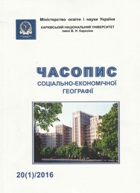New ideas about the structure and functions of national ecological network in the context of modern postnonclassical concepts
Abstract
Today the idea of sustainable development has revealed severe signs of disability as evidenced by the fact that the global environmental problem is steadily worsening. All this makes to question the methodological guidelines which are incorporated into the content of the concept of national ecological networks. One of the main methodological mistakes implied in the development of the concept of ecological networks is bright biocentrism which led to their designing in some virtual space, completely detached from the real spatial organization of society. In fact, building a national ecological network as a spatial phenomenon may not be feasible without “inscribing” it in the specific area subject to certain models of socio-natural interaction. The nearest natural and anthropogenic landscape components approach the state of harmony not barrier but contact borders (in the form of strips, ecotones). Thus the best “contact” between a man and nature should promote exactly informative and ideological functions performed by technogenesis objects. Such theoretical approach provides a new tool for the formalization of relations between nature and society in the organization of the environmental work including formation of the ecological network.
So trips to anthropogenically disturbed landscapes under the new concept of ecotourism should consider all possible demands of tourists and visual observation of different forms and results of anthropogenic impact on nature. Involvement of technogenesis facilities to eco-tourism and local history work in regions of old industrial development has another socio-geographical aspect. Technogenic tourism which may be a separate branch of ecotourism is largely designed to overcome deep contradictions in complex civilizational fault line of the Ukrainian history. In particular, regions such as Kryvbas can provide tourist product mainly involving objects of industrial origin and content. The use of postnonclassical approaches to formation of the national ecological network reveals new features that should carry out modern alternative tourism destinations.
Downloads
References
2. Kazakova, T.A. (2004). Osoblyvosti vedennya zapovidnoi spravy v hirnycho-promyslovykh regionakh (na prykladi Kryvbasu) [Features of reserve management in mining and industrial regions (for example of Kryvbas)]. Ukraine: Geographical problems of sustainable development: Collection of scientific papers. Kyiv: HSV Horizons, 2, 322-326.
3. Kazakova, T.A., Sonko, S.P. (2015). Postindustrialni tendentsii formuvannya terytorialnoi struktury staropromys-lovoho regionu Kryvbasu (na prykladi rozvytku tekhnohennoho turyzmu) [Post-industrial trends in forming the ter-ritorial structure of old industrial region of Kryvbas (in case of man-made tourism)]. Materials of the All-Ukrainian scientific-practical Internet conference “Strategic prospects of tourism, hotel and restaurant industry in Ukraine: theory, practice and innovation development”. Uman: PPC Vizavi, 23-25.
4. Rodoman, B.B. (1974). Polyarizatsiya landshafta kak sredstvo sokhraneniya biosfery i rekreatsionnykh resursov [Polarization of the landscape as a means of saving the biosphere and recreational resources]. Resources, the environment, resettlement. Moscow: Science, 150-162.
5. Sonko, S.P. (2013). Analiz metodologichnykh pidkhodiv do formuvannya natsionalnoi ekolohichnoi merezhi [Analysis of methodological approaches to the formation of a national ecological network]. Scientific Journal NLTU of Ukraine: Actual problems of Forestry and Landscape Architecture. Lviv: RIO NLTU of Ukraine, 23.5, 68-72.
6. Sonko, S.P. (2003). Prostorovyi rozvytok sotsiopryrodnykh system: shlyakh do novoi paradygmy: monografiya [Spatial development of socio-natural systems: the way to a new paradigm]. Kyiv: Nika Centreб 287.
7. Sonko, S.P. (2007). Prostorova struktura noosfery ta mistse u niy obyektiv industrialnoi spadshchyny [Spatial struc-ture of the biosphere and place in it objects of industrial heritage]. Geographical research of Kryvbas. Kryvyi Rig, Publishing House, 44-47.
8. Sonko, S.P., Maksymenko, N.V. (2013). Prostorovi i chasovi mekhanizmy ekologichnoi ekspansii agrolandshaftu [Spatial and temporal mechanisms of ecological expansion of the agricultural landscape]. Man and the environ-ment, 2 (15), 5-21.
9. Topchiev, A.G. (2001). Geograficheskie osnovy geoekologii [Geographical bases of geoecology]. Odessa: Astro-print, 125.




